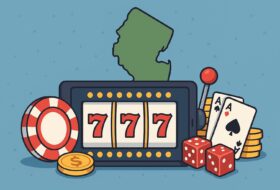
Nigel Eccles, the founder and former CEO of FanDuel, continues his years-long legal pursuit of the company and its institutional investors, KKR & Co. and Shamrock Capital Advisors. FanDuel was acquired by online gambling giant Flutter in 2018. Eccles claims the terms of that deal were not negotiated “at arm’s length” but instead calculated to cut himself and other common shareholders out of any stake in the combined company.
The list of plaintiffs and defendants involved in the case is extremely long. On Eccles’ side are over 100 other former employees who held common stock in FanDuel before the merger. The defendants comprise KKR, Shamrock, various related investment entities, FanDuel’s board members at the time of the deal, and FanDuel itself.
The terms of the FanDuel-Flutter merger didn’t involve a cash transaction. Instead, FanDuel’s stakeholders received roughly 40% equity in the combined company.
Central to the case is the question of whether $559.4 million was a fair enterprise valuation for FanDuel in 2018. That was the maximum price at which preferred shareholders would receive the entire value from any acquisition or merger. At any higher valuation, Eccles and the other common shareholders would have received at least some stake in the resulting company.
Eccles alleges that the valuation was “artificially” low and resulted from a conspiracy by the defendants to “wipe out” the common shareholders.
Because it’s part of Flutter, it’s impossible to put an exact price on FanDuel today. However, its similarly-positioned rival, DraftKings, has a market cap of $16.6 billion as of this writing. FanDuel is the US market leader in sports betting and says it recently took the lead in the online casino vertical, too. Some estimates put its current value at more than $20 billion.
What is Preferred Stock?
Any investment in a company entails some risk. Sometimes, a company will offer preferred stock to mitigate that risk and entice investors.
In a nutshell, holders of preferred stock get “paid first” for their investment. That might be through dividends, an acquisition deal, or the liquidation of assets in the event of bankruptcy. Only after preferred shareholders recoup their investment do the common shareholders get to see a return. FanDuel’s common shareholders included its founders and early employees.
Because they’re at lower risk, preferred stockholders typically receive limited voting control over the company or none at all. That’s to avoid the type of scenario Eccles alleges happened, in which preferred shareholders might make a move that benefits them to the detriment of the common shareholders.
In the case of FanDuel, investors also had a “Drag Along Right.” That meant they could force all shareholders to accept the terms of a takeover offer. However, the offer had to be made “at arm’s length.” That means in accordance with fair market value without factoring in any other relationship between the parties involved. Also, common shareholders still had the right to dispute the terms of such a deal.
Eccles’ filing describes the logic as follows:
Issuing preferred shares along with some common shares to investors enabled the company to give investors priority on returns at lower valuations of the company in the event of a sale while avoiding dilution of employees’ interest in the company’s success, as common shareholder returns were tied to higher company valuations […] those who invested in FanDuel understood from the very beginning that the company’s successes would be shared by all: the founders who created the company, the employees who built it, and the investors who provided capital to help fund it.
FanDuel’s preferred shareholders were entitled to the first $559 million in proceeds from a merger. Eccles’ complaint states that valuing FanDuel’s stake in Flutter at that amount meant the preferred shareholders received the entire stake and common shareholders received nothing.
Ups and Downs for FanDuel Before Flutter Merger
FanDuel has taken a bumpy road to US market leadership. Until 2018, US federal law made sports betting illegal in all states except Nevada, and FanDuel’s main area of business was daily fantasy sports. It had waged an expensive marketing war with DraftKings, peaking in 2015 when they spent a combined $220 million in the first few months of the NFL season.
Over the next two years, both were under increasing regulatory scrutiny. During the same period, the two companies attempted to negotiate a merger of equals. That deal fell through but according to the complaint, would have valued FanDuel at $1.2 billion.
The legal situation in the US changed dramatically in 2018 when the Supreme Court struck down the Professional and Amateur Sports Protection Act (PASPA). That allowed the other 49 states the option to follow Nevada in legalizing sports betting. Thirty-seven have now done so.
The sports betting and online casino verticals now account for most of FanDuel’s revenue. The complaint alleges that FanDuel’s board of directors knowingly excluded the company’s prospects in the sports betting space and committed fraud in setting its enterprise value at $559.4 million, the Subscription Price for FanDuel’s preferred shares.






